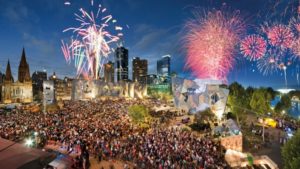Australia Day survey finds migrants embracing Australia
 A large majority of migrants and refugees new to Australia plan to become citizens and feel it is important to mark Australia Day, according to a new survey.
A large majority of migrants and refugees new to Australia plan to become citizens and feel it is important to mark Australia Day, according to a new survey.
Most newcomers say they plan to mark the day in some way and that Australia Day events make them feel more welcome in their new country, the survey found.
But most don’t know the significance of the January 26 date and most are unaware of controversy over calls for date to be changed is response to an outcry by some indigenous Australians.
The survey of 140 new migrants and refugees, commissioned by refugee and migrant settlement agency AMES Australia, also found curiosity on the part of recent arrivals about Australia’s history.
The survey asked ‘Is Australia Day was important for the nation?’ Seventy-nine per cent of respondents said ‘yes’ and just 9 per cent said ‘no’.
Sixty-five per cent said they planned to mark or celebrate the day in some way while 22 per cent said they had no plans.
Less than half (31 per cent) of those surveyed said they knew the significance on January 26 – the day the First Fleet arrived in Port Jackson – while 69 per cent did not.
An overwhelming 89 per cent of respondents said they planned to become Australian citizens while just 11 per cent said they had no plans to become citizens or were not sure.
But just twenty-nine per cent of those surveyed said they were aware of the controversy over Australia Day prompted by some indigenous groups calling it ‘invasion day’ and calls to change the date.
Of those who were aware of the controversy, most (38 per cent) were in favour of changing and 35 per cent were in favour of keeping the January 26 date which 28 per cent were unsure.
More than half (54 per cent) said Australia Day would mean more them it they were citizens while 40 per cent said it would make no difference.
Eighty-one per cent of respondents said they knew, or planned to learn more, about Australia’s history and the reasons Australia Day is celebrated while 11 per cent said they did not.
The survey found Australia day events and the tone of publicity around the day helped new arrivals feel welcome.
Almost three-quarters (74 per cent) said the day helped them to feel more welcome while 26 per cent said it made no difference and 11 per cent said it made them feel less welcome.
Iraqi refugee Osama Butti said he was looking forward to celebrating Australia Day and for the first time understanding its significance.
“I think Australia day is important for the nation, it shows that Australia is a united and peaceful country,” Mr Butti said.
He said Australia Day would mean more to him once he became a citizen.
“When I become a citizen, Australia Day will be part of will be the history of my new country, my new home.
“But even now, even though I am not yet a citizen, I feel welcome here beyond my expectations,” said Mr Butti, who arrived in Australia with his wife and two children early last year.
Canadian migrant Mabel Estrella, who becomes an Australian citizen on Australia Day, said becoming a citizen was important to her as a way of showing a commitment to the country.
“I think it is only right that my family make a commitment to becoming Australians and accepting the rights and responsibilities that come with that given that we are enjoying the benefits that come with living in this amazing country,” Ms Estrella said.
AMES Australia CEO Cath Scarth said the survey showed that migrants and refugees new to Australia were committed to becoming part of the wider society.
“What the survey tells us is that migrants who come to this country have a commitment to it and want to become part of its social fabric,” Ms Scarth said.
“It shows that most migrants want to contribute to Australia, want to learn its history and customs and want to embrace and become part of broader society,” she said.
Laurie Nowell
AMES Australia Senior Journalist












